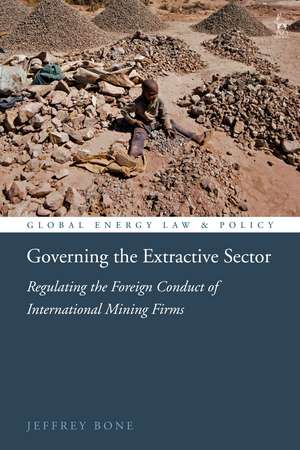Governing the Extractive Sector: Regulating the Foreign Conduct of International Mining Firms: Global Energy Law and Policy
Autor Jeffrey Boneen Limba Engleză Hardback – 24 feb 2021
| Toate formatele și edițiile | Preț | Express |
|---|---|---|
| Paperback (1) | 251.10 lei 6-8 săpt. | |
| Bloomsbury Publishing – 19 oct 2022 | 251.10 lei 6-8 săpt. | |
| Hardback (1) | 468.48 lei 6-8 săpt. | |
| Bloomsbury Publishing – 24 feb 2021 | 468.48 lei 6-8 săpt. |
Preț: 468.48 lei
Preț vechi: 646.84 lei
-28% Nou
Puncte Express: 703
Preț estimativ în valută:
89.64€ • 93.59$ • 74.19£
89.64€ • 93.59$ • 74.19£
Carte tipărită la comandă
Livrare economică 05-19 aprilie
Preluare comenzi: 021 569.72.76
Specificații
ISBN-13: 9781509941872
ISBN-10: 1509941878
Pagini: 264
Dimensiuni: 156 x 234 mm
Greutate: 0.54 kg
Editura: Bloomsbury Publishing
Colecția Hart Publishing
Seria Global Energy Law and Policy
Locul publicării:London, United Kingdom
ISBN-10: 1509941878
Pagini: 264
Dimensiuni: 156 x 234 mm
Greutate: 0.54 kg
Editura: Bloomsbury Publishing
Colecția Hart Publishing
Seria Global Energy Law and Policy
Locul publicării:London, United Kingdom
Caracteristici
Offers a fresh take on a solution for a home state government and its extractive industry to achieve the obligations set out in the United Nations Guiding Principles on Business and Human Rights
Notă biografică
Jeffrey Bone is Assistant Professor of Business Law at the Erivan K Haub School of Business, Saint Joseph's University, USA.
Cuprins
PART ITHE PROBLEM PERSISTS1. Dark History I. Germs of Empires II. The Extractive Sector at the Gates A. Yanacocha B. Bhopal 2. The Case for Civil Society and Corporate Actors I. Civil Society: Origins and Impact A. A Potential New Form of Medievalism B. Social Licence for Business: Bestowed by Civil Society II. Corporate Accountability, Responsibilities and Self-Governance PART IITHE JUDICIAL AND NON-JUDICIAL APPROACH3. Obstacles in Holding Corporations to Account I. Justification for Home State Regulation A. Limitations of International Regulation B. Concerns with Host State Judicial Systems II. Substantive and Procedural Hurdles A. Limited Liability of Corporations 4. The United States I. The Alien Tort Statute A. Elusive History B. Sosa C. Kiobel D. Involvement of Civil Society 5. Canada, the UK and Australia I. Canada II. United Kingdom III. AustraliaIV. Assessment of the Case Law 6. Utilising State-based and Civil Society Sponsored Mechanisms I. Failing Solutions II. Canada: Office of the CSR Counsellor A. World Bank Group's Performance Standards B. Voluntary Principles on Security and Human Rights C. Global Reporting Initiative D. OECD Guidelines for Multinational Enterprises III. History of FailureIV. The Canadian Ombudsperson for Responsible Enterprise V. Oxfam Australia's Mining Ombudsman A. Achievement of Limited Success PART IIIPROPOSAL7. A New Policy Direction I. Key Terms II. Canada's Approach III. Proposal: Framework for Reforming the Office of the CORE A. Implementation of the Performance Guidelines B. The Development of a Bounty Programme C. Untapped Potential: Site-Level Grievance Mechanisms D. Civil Society within the Regulatory Regimes of the Global Extractive Sector E. Enforcement, Accountability and Compliance F. Procedural Fairness and Judicial Review G. Critique of the Proposal 8. Accountability, Effectiveness and Contrast I. Testing Effectiveness of the Proposal under UN Guiding Principle 31 A. LegitimateB. Accessible C. Predictable D. EquitableE. Transparent F. Rights-compatible G. A Source of Continuous Learning H. Based on Engagement and Dialogue II. Role for Civil Society Actors and Corporate Self-Governance III. Contrast and Approach IV. Simons and Macklin's Proposal to Correct the 'Governance Gap' V. Torrance's Proposal VI. Proposal Set Out by the Canadian Network on Corporate Accountability VII. Other Proposals VIII. Contrast of the Various Proposals IX. Concluding Thoughts Appendix: Draft Operating Procedures for the Canadian Ombudsperson for Responsible Enterprise








